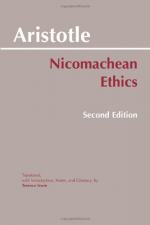|
This section contains 732 words (approx. 2 pages at 400 words per page) |

|
Book VII Summary and Analysis
Aristotle now looks at virtue from another angle by looking at the states of character that should be avoided. These are vice, incontinence and bestiality. The opposites of vice and incontinence are virtue and continence. Bestiality, as Aristotle defines it, is a state where a person behaves no better than a beast. It is possibly the lowest state of human existence, and its opposite is something that is even higher than virtue, perhaps what would be called "divine." He promises to address this in a later section and begins to discuss incontinence.
Incontinence, as meant by Aristotle, is a lack of self-control. To examine it, Aristotle takes up the same method he has used before. He first speaks about what is said about people who are incontinent. He next addresses some of the "puzzles" that exist about these commonly...
(read more from the Book VII Summary)
|
This section contains 732 words (approx. 2 pages at 400 words per page) |

|




